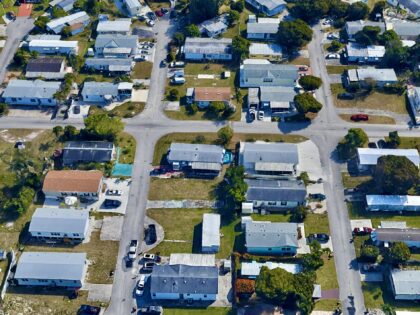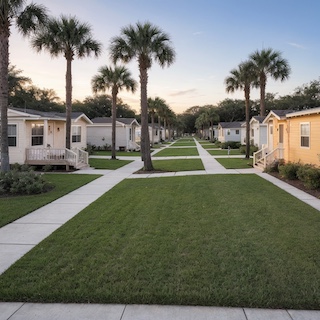
What Are The Statistics
Believe it or not, statistics have stated that Florida has over 5,400 Mobile home parks (“MHP”), lodging and recreational vehicle parks, and recreational camps. These communities are licensed annually by the Department of Health through Florida’s 67 County Health Departments, in accordance with Chapter 513, Florida Statutes and Chapter 64E-15, Florida Administrative Code.
Property managers that manage Florida MHPs, need to be will versed in Chapters 723 and Chapter 83, Part II of the Florida Statutes, F.A.C. 61B-29 through 35, and F.A.C. 61M-1.
When it comes to evictions from a lot in a MHP, the property manager first needs to determine if the structure is determined to be a mobile home, and if the answer is yes, if the mobile home home is privately owned or is owned by the MHP. MHPs offering 10 or more lots for rent or lease fall within Chapter 723 if the structure is a mobile home and the mobile home is privately owned. The owner of the mobile home is referred to as the MHP tenant.
4 Ways To Evict A Tenant From A Mobile Home In Florida
According to §723.061, Florida Statutes, there are 4 ways a mobile home tenant can be evicted from the MHP.
- The tenant fails to pay the lot rental amount;
- The tenant is convicted of violating the law and said violation is detrimental to the health, safety, or welfare of other residents of the MHP;
- The tenant violates the lot rental agreement, rules and regulations of the MHP or Chapter 723; or
- The MHP changes the use of the land where the MHP is located.



Chapter 723 of the Florida Statutes is the portion of Florida’s legal code that pertains to mobile home park evictions. This chapter outlines the procedures that must be followed in order to legally evict a tenant from a mobile home park in Florida.
Under Chapter 723, depending on the particular tenant violation, a mobile home park owner (referred to as the “landlord”) must first serve the tenant with a written notice of eviction that states the reason for the eviction and informs the tenant of their right to cure or vacate before the eviction is filed with the court.
If the tenant does not vacate the property or cure the violation, the landlord can file an eviction action with the court. If the tenant contests the eviction, a court hearing may be scheduled, during which the tenant will have the opportunity to present evidence and arguments in their defense. The judge will then decide whether the eviction should proceed.
If the judge rules in favor of the landlord, the tenant will be given a set period of time (typically 10 days) to vacate the property. If the tenant does not vacate the property within the allotted time, the landlord may file a writ of possession with the court, which will allow the sheriff to physically remove the tenant from the property.
It is important to note that the eviction process can be complex and time-consuming, and it is essential to follow all of the legal procedures in order to avoid potential legal issues.
Hire Experienced Evictions Lawyers
Law Office of Ryan S. Shipp, PLLC is a law firm located in Palm Beach County, Florida that specializes in representing mobile home park owners in eviction proceedings. The firm is owned and operated by attorney Ryan S. Shipp, who has years of experience in the field of mobile home evictions and is well-versed in the legal requirements for evictions in Florida.
The attorneys at Law Office of Ryan S. Shipp, PLLC are dedicated to providing personalized and effective legal representation to their clients. They understand that eviction cases can be complex and stressful, and they work tirelessly to ensure that their clients receive the best possible representation and guidance throughout the process.
In addition to their expertise in mobile home evictions, the attorneys at Law Office of Ryan S. Shipp, PLLC also have experience in a variety of other legal areas, including landlord-tenant law, real estate law, and business law. This allows them to provide a full range of legal services to their clients and to help them navigate the complex legal landscape.
If you are in need of legal representation in a mobile home eviction case in Florida, contact Law Office of Ryan S. Shipp, PLLC to discuss your case and learn more about how we can help. Call us today @ 561.699.0399.
Alachua County Mobile Home Eviction Lawyers | Baker County Mobile Home Eviction Lawyers | Bay County Mobile Home Eviction Lawyers | Bradford County Mobile Home Eviction Lawyers | Brevard County Mobile Home Eviction Lawyers | Broward County Mobile Home Eviction Lawyers | Calhoun County Mobile Home Eviction Lawyers | Charlotte County Mobile Home Eviction Lawyers | Citrus County Mobile Home Eviction Lawyers | Clay County Mobile Home Eviction Lawyers | Collier County Mobile Home Eviction Lawyers | Columbia County Mobile Home Eviction Lawyers | DeSoto County Mobile Home Eviction Lawyers | Dixie County Mobile Home Eviction Lawyers | Duval County Mobile Home Eviction Lawyers | Escambia County Mobile Home Eviction Lawyers | Flagler County Mobile Home Eviction Lawyers | Franklin County Mobile Home Eviction Lawyers | Gadsden County Mobile Home Eviction Lawyers | Gilchrist County Mobile Home Eviction Lawyers | Glades County Mobile Home Eviction Lawyers | Gulf County Mobile Home Eviction Lawyers | Hamilton County Mobile Home Eviction Lawyers | Hardee County Mobile Home Eviction Lawyers | Hendry County Mobile Home Eviction Lawyers | Hernando County Mobile Home Eviction Lawyers | Highlands County Mobile Home Eviction Lawyers | Hillsborough County Mobile Home Eviction Lawyers | Holmes County Mobile Home Eviction Lawyers | Indian River County Mobile Home Eviction Lawyers | Jackson County Mobile Home Eviction Lawyers | Jefferson County Mobile Home Eviction Lawyers | Lafayette County Mobile Home Eviction Lawyers | Lake County Mobile Home Eviction Lawyers | Lee County Mobile Home Eviction Lawyers | Leon County Mobile Home Eviction Lawyers | Levy County Mobile Home Eviction Lawyers | Liberty County Mobile Home Eviction Lawyers | Madison County Mobile Home Eviction Lawyers | Manatee County Mobile Home Eviction Lawyers | Marion County Mobile Home Eviction Lawyers | Martin County Mobile Home Eviction Lawyers | Miami-Dade County Mobile Home Eviction Lawyers | Monroe County Mobile Home Eviction Lawyers | Nassau County Mobile Home Eviction Lawyers | Okaloosa County Mobile Home Eviction Lawyers | Okeechobee County Mobile Home Eviction Lawyers | Orange County Mobile Home Eviction Lawyers | Osceola County Mobile Home Eviction Lawyers | Palm Beach County Mobile Home Eviction Lawyers | Pasco County Mobile Home Eviction Lawyers | Pinellas County Mobile Home Eviction Lawyers | Polk County Mobile Home Eviction Lawyers | Putnam County Mobile Home Eviction Lawyers | St. Johns County Mobile Home Eviction Lawyers | St. Lucie County Mobile Home Eviction Lawyers | Santa Rosa County Mobile Home Eviction Lawyers | Sarasota County Mobile Home Eviction Lawyers | Seminole County Mobile Home Eviction Lawyers | Sumter County Mobile Home Eviction Lawyers | Suwannee County Mobile Home Eviction Lawyers | Taylor County Mobile Home Eviction Lawyers | Union County Mobile Home Eviction Lawyers | Volusia County Mobile Home Eviction Lawyers | Wakulla County Mobile Home Eviction Lawyers | Walton County Mobile Home Eviction Lawyers | Washington County Mobile Home Eviction Lawyers






